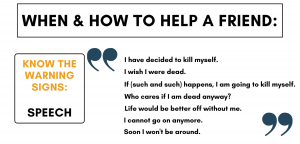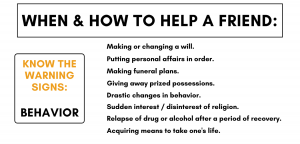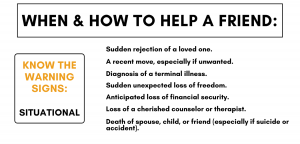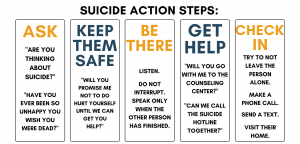Mental Wellness
SUICIDE
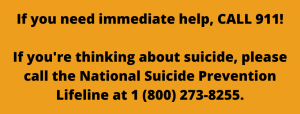 College is an opportunity full of self-growth, purpose, and accomplishment. Starting college is a proud moment for students, families, and communities. However, college campuses have another growing reality, suicide. Suicide is the second leading cause of death for those between the ages of 10 – 43 living within the United States (MacPhee, 2019).
College is an opportunity full of self-growth, purpose, and accomplishment. Starting college is a proud moment for students, families, and communities. However, college campuses have another growing reality, suicide. Suicide is the second leading cause of death for those between the ages of 10 – 43 living within the United States (MacPhee, 2019).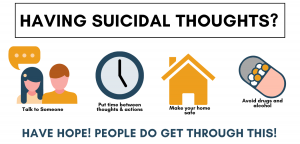 Talking to Someone?
Talking to Someone?
- Who to talk to
- Find someone who will simply listen and be there for you. It doesn’t matter who it is, as long as it’s someone you trust and who is likely to listen with compassion and acceptance. When in doubt, try a hotline.
- What to say
- Tell the person exactly what you are telling yourself. If you have a suicide plan, explain it to them. Phrases like ‘I’m done’ are vague and do not illustrate how serious things really are. If it is too difficult for you to talk about, try writing it down and handing a note to the person you trust. Or send them an email or text and sit with them while they read it.
- If you don’t feel understood
- If the first person you reached out to doesn’t seem to understand, tell someone else, go to a different support group, or try calling a suicide crisis helpline again. Don’t let a bad experience stop you from finding someone who can help.
When and How to Help a Friend
What Not to Do:
- Promise confidentiality – A life is at stake and you may need to speak to a mental health professional in order to keep the suicidal person safe. If you promise to keep your discussions secret, you may have to break your word.
- Judge the person – Set aside your personal beliefs about suicide. Do not act shocked, lecture on the value of life, or say that suicide is wrong, selfish, or cowardly. Doing these things can exacerbate the person’s feelings of alienation.
- Make the person justify their feelings – Avoid saying things like: “You have so much to live for,” “Your suicide will hurt your family,” or “Things could be worse.” You don’t want to make the person feel like they have to justify their suicidal feelings because we tend to believe what we hear ourselves say.
Suicide Prevention Training:
- QPR
- QPR is an introductory training for anyone wanting to learn how to help a person at risk of suicide. Learn how to identify the warning signs of a suicide crisis and how to respond.
- Kognito
- This interactive role-play simulation will prepare you to lead real-life conversations with fellow students in distress and connect them with support.
- ASIST – Applied Suicide Intervention Skills Training
- ASIST is a two-day interactive workshop that teaches you how to recognize someone who may be at risk for suicide, how to intervene and promote safety and how to identify appropriate supports to help keep the person safe. This course is designed as an in-depth training for suicide prevention.
- Mental Health First Aid
- This training will give you tools to help people with mental health challenges get the help they need. You will learn about the impact of mental illness in the U.S., warning signs for anxiety, psychosis, depression and addiction and a five-step action plan to help an individual in crisis connect to professional care.
- Classes from the Jason Foundation
- These training modules introduce the national health issue of youth suicide. You’ll learn about warning signs and risk factors and how respond to at-risk individuals.
- American Association of Suicidology (AAS)
- The AAS website contains a plethora of information relating to suicide, including a section discussing how to identify the suicide warning signs.
- Centers for Disease Control and Prevention – Suicide Prevention
- Statistics, general information and information about how to prevent suicide.
- NAMI – Family-to-Family
- The National Alliance on Family Illness provides a free educational program for those who live with a loved one suffering from mental illness. The training is provided locally and can teach caregivers and family members to identify and deal with crises as they arise.
- SAVE: Suicide Awareness Voices of Education
- Delivers information on how to prevent suicide and help those suffering from problems that may lead to suicide. SAVE also supports the National Outreach Network which works with local organizations to distribute information about suicide awareness.
- Seize the Awkward Campaign
- JED Foundation has helpful videos to guide students through the conversation, called the Seize the Awkward campaign. Talking to your friend about mental health can be scary – but reaching out when you’re feeling down or when you see a friend struggling can make a huge difference. Watch these mental health stories and see how it made a difference for Billie Eilish, Liza Koshy, Tyler Posey, and so many more.
For more information, please visit wou.edu/mental-health

